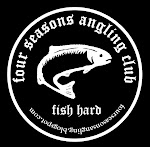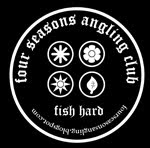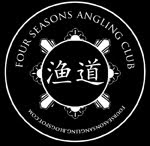
I caught this monster fish with a fly. This guy had enough of a fight, for me to notice it and bring it out of the water. This guy holds the record for the smallest fish I have caught. I had to let it go.
"Rivers and the inhabitants of the watery elements are made for wise men to contemplate and for fools to pass by without consideration."
 I had a chance to fish in Phuket over the past summer, and I caught some tuna and ate it on the boat with nothing more than some soy sauce & wasabi. OK.
I had a chance to fish in Phuket over the past summer, and I caught some tuna and ate it on the boat with nothing more than some soy sauce & wasabi. OK. People have been practicing catch and release for more than a century in order to prevent certain species from disappearing. Catch and release is mandatory for many species in many parts of the world. However, there is and always will be the debate about catch and release... about the capability of fish to feel pain, about recreational fishing in general and ethics surrounding it. I have my opinions about this, but I prefer to stay out of the debates. Regardless of ethical position, I am convinced that catch and release is a conservation practice, and is necessary to prevent extinction of some fish. I've heard of people that will cut up the tires on your car if they see you take fish (even if it's legally allowed) and that kind of thing is just plain stupid, not to mention hazardous to their health.
People have been practicing catch and release for more than a century in order to prevent certain species from disappearing. Catch and release is mandatory for many species in many parts of the world. However, there is and always will be the debate about catch and release... about the capability of fish to feel pain, about recreational fishing in general and ethics surrounding it. I have my opinions about this, but I prefer to stay out of the debates. Regardless of ethical position, I am convinced that catch and release is a conservation practice, and is necessary to prevent extinction of some fish. I've heard of people that will cut up the tires on your car if they see you take fish (even if it's legally allowed) and that kind of thing is just plain stupid, not to mention hazardous to their health. This (the subject of catch & release) is a good thing to discuss, and I am sure my fishing mentors have their point of views on this.
This (the subject of catch & release) is a good thing to discuss, and I am sure my fishing mentors have their point of views on this.

 Like some objects in design, I am pretty sure that I am mainly attracted to the aesthetic value of the artic grayling. From the pictures and illustrations I have seen, artic grayling possess a visual quality that is clearly more flamboyant than most fish. From the dynamic overall shape of the body to the signature dorsal fin, the fish is beautiful in form. The color of the fish seems fairly neutral, but have accents of color on their body which creates a very sophisticated combination. They are said to have once been a common and abundant fish, with feeding pattern that makes them easy to catch. This combination of simplicity in character (or feeding pattern) and a common presence are definite attributes that make the artic grayling attractive to me. I also read that they can no longer be found in north America, which is unfortunate - but to some extent, I guess that's the reason why I think about this fish.
Like some objects in design, I am pretty sure that I am mainly attracted to the aesthetic value of the artic grayling. From the pictures and illustrations I have seen, artic grayling possess a visual quality that is clearly more flamboyant than most fish. From the dynamic overall shape of the body to the signature dorsal fin, the fish is beautiful in form. The color of the fish seems fairly neutral, but have accents of color on their body which creates a very sophisticated combination. They are said to have once been a common and abundant fish, with feeding pattern that makes them easy to catch. This combination of simplicity in character (or feeding pattern) and a common presence are definite attributes that make the artic grayling attractive to me. I also read that they can no longer be found in north America, which is unfortunate - but to some extent, I guess that's the reason why I think about this fish. I think about going up to Alaska where these fish lives with my fishing friends, and discussing the aesthetic value of the fish when we actually catch it and hold it in our hands. To discuss how they are different from when we saw them in photos, and see them with a background of mountains and water that is picture perfect. Perhaps all this thinking about the artic grayling will lead to disappointment when I actually catch one in Alaska, but then again, perhaps not. I will leave that up to that moment. For now, I have declared the artic grayling as my mascot fish. There is one other fish that competes with the artic grayling in status for me, and that it the "cherry trout" (Oncorhynchus masou), which is native to the Korean peninsula. According to the guide James Card (best fly fishing guide in Korea) "They return to their home rivers when the blossoms of the cherry trees open in spring, hence the name cherry trout." It is through his website (http://jamescard.net/) that I first learned about this cherry trout. The story of both fish are poetic and worth thinking about.
I think about going up to Alaska where these fish lives with my fishing friends, and discussing the aesthetic value of the fish when we actually catch it and hold it in our hands. To discuss how they are different from when we saw them in photos, and see them with a background of mountains and water that is picture perfect. Perhaps all this thinking about the artic grayling will lead to disappointment when I actually catch one in Alaska, but then again, perhaps not. I will leave that up to that moment. For now, I have declared the artic grayling as my mascot fish. There is one other fish that competes with the artic grayling in status for me, and that it the "cherry trout" (Oncorhynchus masou), which is native to the Korean peninsula. According to the guide James Card (best fly fishing guide in Korea) "They return to their home rivers when the blossoms of the cherry trees open in spring, hence the name cherry trout." It is through his website (http://jamescard.net/) that I first learned about this cherry trout. The story of both fish are poetic and worth thinking about.











